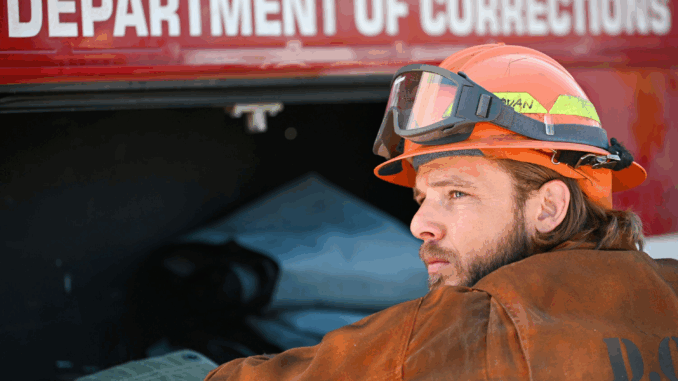
A Show With Real-World Consequences
When Fire Country premiered, it was praised for its intensity, its flawed characters, and its dramatic depiction of prison fire camps. But over time, something unexpected began to happen: the show started influencing real lives.
Across the U.S., young people — especially those from rural and underserved communities — began applying to firefighter training programs. And many of them pointed to one source of inspiration: Max Thieriot’s character, Bode Donovan.
“It made me realize I could make a difference, even with a messed-up past,” one fan wrote. “I signed up for my county’s volunteer fire program the next day.”
A Story That Feels True
Part of the impact comes from Fire Country’s emotional honesty. It doesn’t glamorize firefighting. It shows the sweat, the sacrifice, the fear, and the emotional toll — alongside the moments of courage, redemption, and brotherhood.
Max Thieriot made sure of that. Having grown up in Northern California’s wildfire zones, he brought real-world authenticity to the script — insisting that firefighters be portrayed as human, not superhuman.
“They’re not superheroes,” Max says. “They’re your neighbor, your cousin, your second chance. That’s what makes them brave.”
Collaborating With Fire Agencies
To ensure realism, the Fire Country team consulted with Cal Fire, state prison fire camp leaders, and active firefighters. Max even shadowed crews and studied how real fire operations worked — from chainsaw handling to incident command.
This collaboration paid off. Multiple departments reported a spike in interest from new recruits shortly after the series aired.
In California, one fire academy coordinator noted a 20% increase in inquiries from young adults, many of whom cited Fire Country as their entry point.

Hope for the Incarcerated
One of the show’s most unique aspects is its portrayal of incarcerated men fighting fires — a real program that few Americans knew existed. By giving faces and names to these characters, Fire Country helped humanize a misunderstood system.
Former inmates have written to Max, thanking him for showing the truth of their experience — the guilt, the hope, and the desire to contribute.
“It’s the first time I saw someone like me treated like a person on TV,” one letter read.
Inspiring Women and Minorities
Beyond traditional audiences, Fire Country has resonated with women and people of color — groups historically underrepresented in firefighting.
Max has made a point to include diverse characters in key roles, like Gabriela Perez (Stephanie Arcila), a strong female firefighter-paramedic who helps anchor the show’s emotional core.
That representation matters. Recruiters say the show has helped broaden the image of who belongs in the firehouse — and made it more inviting for those who never saw themselves there before.
Using Storytelling for Service
Max never set out to start a recruitment movement. But he’s proud the show is helping bridge gaps between public service and public understanding.
He’s even spoken with fire departments about creating PSAs, internship partnerships, and outreach programs, using Fire Country as a tool to connect with younger audiences.
“If a TV show can save one life — or convince someone to choose purpose over chaos — then it’s worth everything,” Max says.
Legacy Beyond Entertainment
While Fire Country will someday end, Max hopes its impact on real-world firefighting will endure — not just in recruitment numbers, but in deeper empathy for the people behind the badge.
He dreams of producing documentaries, partnering with fire academies, and continuing to use storytelling to highlight unseen heroes.
Because for Max Thieriot, fire isn’t just a plot device. It’s a reality — one that deserves truth, respect, and human connection.
